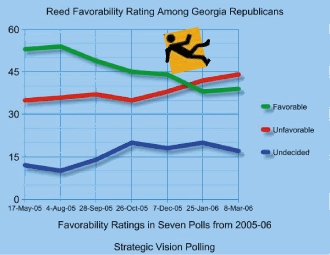|
Political Irony Resurrected in Georgia
The Bible informs us that resurrection is accompanied by a stench. Just before Lazarus climbed out of his tomb, swaddled in grave clothes, a follower of Jesus noted, "Lord... he stinketh!" (Gospel According to John, 11:38-39). And so it has come to pass with the resurrection of political irony in Georgia. Reed is gambling that conservatives will still hold their noses and vote for him. Yet Barber, his campaign's kick-off speaker, stinketh of the same gambling industry ties that have threatened to bury Reed's political future. In fact, Barbour represented the Indian tribe that Abramoff and Reed were lobbying against on behalf of another Indian tribe -- not because they wanted to end gambling, but because they wanted to limit competition in the gambling industry. Reed even bragged to Abramoff that he could convince Focus on the Family founder James Dobson to go after Barbour on the air in Louisiana for his representation of an Indian tribal casino. Apparently, Reed did not disclose to Dobson his own ties to a rival Indian tribal casino. In fact, Reed devoted considerable time and effort to concealing the source of funds he received from Abramoff's gambling industry clients. Veteran reporter Jack Newfield detailed the nature of the lobbying work that Abramoff paid Reed to do in opposition to Barbour, in "Ralph Reed's Gamble," an investigative piece that ran in The Nation in July 2004. Newfield writes: In early 2002 the Coushatta tribe of Louisiana was desperately trying to kill a planned competing casino that the rival Jena Band wanted to build in southwestern Louisiana. This new casino would have broken the Coushattas' geographical monopoly and cost the tribe--whose casino was grossing $300 million a year-- an estimated $1 billion in gambling revenue over five years. The Jena Band had hired former GOP national chairman Haley Barbour to make sure its casino compact was approved by the heavily politicized Bureau of Indian Affairs. So the Coushatta tribe, which already was in the process of paying Abramoff and Scanlon some $32 million over three years, also hired Reed, according to three witnesses and documents obtained by The Nation. This was not a crime, just furtive hypocrisy. But Reed and Barbour have not always lobbied for opposing teams. For example, Barbour and Reed both lobbied on behalf of MicroSoft in 1999. MicroSoft paid Reed to lobby the George W. Bush presidential campaign in opposition to the government's antitrust case against the software giant. MicroSoft aimed to curry favor with the Republican presidential front-runner, hoping that Bush would take a gentle approach toward the company's monopolistic practices if elected president. After The New York Times revealed the lobbying deal in April 2000, Reed apologized for the "appearance of conflict" -- since he also served at the same time as a paid consultant and senior advisor for the Bush campaign. Nevertheless, he continued to accept MicroSoft's money (about $20,000 per month, according to invoices obtained by Americablog) until May 2005, when the software giant ended the lobbying contract in the midst of the Indian gaming scandal. The Indian gaming investigation has left Reed unable or unwilling to respond to a high-profile ad campaign by the Campaign to Defend the Constitution (DefCon), which accuses him and two other religious right leaders -- Rev. Lou Sheldon and James Dobson -- of being "knee-deep in the Jack Abramoff scandal." Reed has not even responded to repeated -- and pointed -- questions from the conservative evangelical weekly World Magazine, which is among Reed's sharpest critics. It is little wonder, then, that Reed's lead over his Republican rival, State Senator Casey Cagle, has dropped from 17 points last September to just 5 points in the latest tracking poll released on March 8, 2006, by Strategic Vision, an Atlanta-based polling firm that works mostly for Republicans. If the election were held today, 41 percent of Georgia Republicans polled would vote for Reed, compared with 36 percent who would choose Cagle; that leaves a large number of undecided voters (23 percent). But over the past few months, undecided voters have been drifting toward Cagle, who, like Reed, is a conservative, evangelical Christian in favor of limiting abortion rights. And in contrast to Reed, who has never held an elected, public office, Cagle is a seasoned state senator.
Even more remarkable, a plurality of Georgia Republicans now view Reed unfavorably. Fully 44 percent of Georgia Republicans polled hold an "unfavorable" view of Reed, while only 39 percent view him favorably, and 17 percent remain undecided. In contrast, 38 percent have a favorable view of Cagle, while only 19 percent view him unfavorably, and 43 percent remain up-for-grabs in their opinion of Reed's opponent. That's a remarkable turn-around since August 4, 2005, when Strategic Vision's poll showed Reed with a favorable rating of 54 percent and an unfavorable rating of just 36 percent. And Reed's lead has been cut by more than two-thirds since Strategic Vision's poll dated September 28, 2005, when he led Cagle by 17 points.
Political Irony Resurrected in Georgia | 7 comments (7 topical, 0 hidden)
Political Irony Resurrected in Georgia | 7 comments (7 topical, 0 hidden)
|
||||||||||||
| ||||||||||||




 print page
print page
